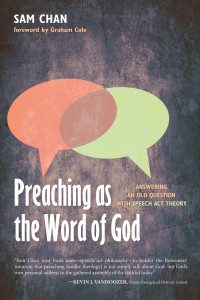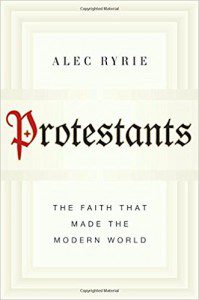The following is an interview with Sam Chan (Ph.D., M.D.), an Aussie theologian, preacher, and medical doctor who writes and gives talks from the Bible about life, faith and work. Sam is a public speaker for City Bible Forum and works as a physician in Sydney. Sam has just published the book, Preaching as the Word of God: Answering an Old Question with Speech-Act Theory.
How did you land on the subject of preaching for your main research interest (i.e. dissertation and now this book)?
Before I went to seminary, I was a preacher. I was regularly being asked to preach at churches, schools, and conferences.
So I went to seminary to learn to become a better preacher. But along the way I was intrigued by the

question – what gave me the right to preach at all?
Who was I to think that my human words were the same as God’s words? I am a finite, fallen, and fallible person. So how on earth could I claim to be preaching God’s Word? And how could any preacher claim to be preaching God’s Word?
And why have preaching at all? If the Bible is the Word of God, then why don’t we just read the Bible? Why do we need preaching—which is basically the subjective explanation and application of the Bible by a human interpreter?
To answer this, I used a three-pronged approach: (1) a historical theology of Luther and Calvin’s views of preaching. (2) A biblical theology of preaching in the Bible’s storyline. And (3) I used philosophical theology by applying speech-act theory.
What surprised you in writing your book?
Three things surprised me.
First, I was surprised by the high view of preaching of Luther and Calvin. They made it one of the marks of the true church.
But more than that, because of Luther and Calvin, preaching is the climax of the Protestant church service. Just think about that. Everything in our Protestant service is designed to set up preaching as the climactic moment when we hear God. According to the Reformers, preaching is the God-human interface.
Which then sets up the question. Can preaching be everything that the Reformers claim that it is? A mark of the true church? The voice of God? The God-human interface?
Second, I was surprised by some of the images of preaching in the Bible. Often we only think of preachers as prophets or teachers. But Isaiah’s Suffering Servant was also a Preaching Suffering Servant. The Bible then applies this image to Jesus, the apostles, and finally the Christian Church.
Third, I was surprised by how neatly speech-act theory applied to preaching. Up until now we’ve mainly applied speech-act theory to the written Word of God. But speech-act theory, as the name implies, is an even better fit for the spoken Word of God.
Basically, if the preacher is indeed preaching the Word of God, then the preacher is performing a speech-act—i.e., God’s speech-act.
How would you assess the status of preaching today? Are there lots of good preachers? More bad ones? Is preaching still viable in our age?
 Speech-act theory gives us some brilliant criteria for assessing the status of preaching today.
Speech-act theory gives us some brilliant criteria for assessing the status of preaching today.
For example, if we only preach propositions from the Bible, then we’re only locuting (speaking) the Word of God, but failing to perform its illocutionary (indended, communicative) act.
Or if we only preach for emotional and existential impact, then we might be illocuting without locuting the Word of God.
Or if we try to manipulate our audience, then we are aiming for perlocution (intended effect of communication) without the necessary prior locution and illocution of the Word of God.
What advice would you give you to preachers today?
See yourself as the Preaching Suffering Servant of Isaiah
And understand that we are locuting and illocuting the Word of God, and then praying that the Spirit will use our words for God’s desired perlocution (i.e., intended, transformational effect).
And for some of us, that means doing proper exegesis of the Word of God so that we are better locuters.
For some of us, that means we need to illocute as well as locute. We are doing more than just teaching and explaining the Word of God. We are performing God’s speech-acts, such as blessing, promising, warning, judging, and covenanting.
And for all of us, we need to pray that the Spirit uses our speech-act for the perlocution of the Word of God.












